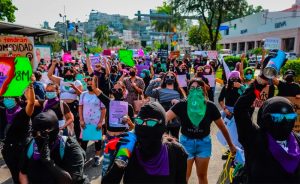By: Lily Fontenot, 2L
On March 8, 2021, in honor of International Women’s Day, approximately 20,000 women marched the streets of Mexico City demanding that the country take action against the widespread violence against women. The women, through their powerful chants and signs, demanded justice for victims of rape, femicide and other gender crimes and an end to all gender-based violence in Mexico, where an average of 10 women were killed per day last year. Moreover, this year’s march built off of last year’s 2020 International Women’s Day protest condemning gender-based violence, where an estimated 80,000 Mexican women participated. After an outbreak of violence at this year’s protest, 62 police officers and 19 civilians were injured with at least 9 police officers and one protester taken to the hospital for non-life-threatening injuries, according to the Mexico City Security Ministry.
Furthermore, the 2021 women’s march was fueled by anger at President Andrés Manuel López Obrador for supporting and defending a politician accused of rape by several women. Despite the fact that he is the target of an ongoing criminal investigation, Félix Salgado Macedonio, a former senator, is favored to win the upcoming election in June, fueled by support from the president. Even though he has insisted that his government is committed to equality, President López Obrador has repeatedly belittled the women’s protest movement and dismissed feminist groups as being politically motivated.
Notably, Mexico is a State party to the Convention on the Elimination of All Forms of Discrimination Against Women (CEDAW), which is the international human rights treaty that obliges States to end to all gender discrimination. Specifically, Mexico has the obligation to “adopt appropriate legislative and other measures, including sanctions where appropriate, prohibiting all discrimination against women” and “take all appropriate measures, including legislation, to suppress all forms of traffic in women and exploitation of prostitution of women,” pursuant to Article 2 and Article 6 respectively.
Additionally, during the ninth periodic report of Mexico in 2018, the Committee in charge of monitoring CEDAW compliance noted its deep concern for the persistence of high levels of insecurity, violence, and organized crime against women in the country. In response, the Committee urged the Mexican government to adopt measures to prevent “the persistent patterns of widespread gender-based violence against women and girls across the State party, including physical, psychological, sexual and economic violence, as well as the increase in domestic violence, enforced disappearances, sexual torture and murder, especially feminicide.” Thus, it is clear that the Mexican government must acknowledge its failures and, consequently, take affirmative steps to combat all gender-based violence in the country.





